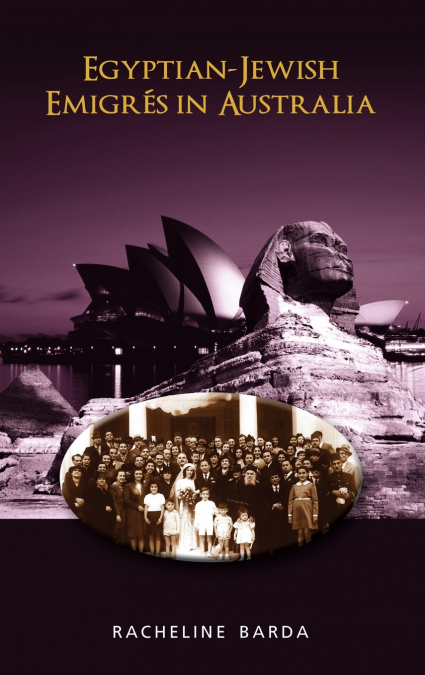
Racheline Barda
Until the mid 1950s, the Jews of Egypt lived in a multicultural and diverse society, which constituted a model of conviviality and tolerance, using French as its lingua franca. The Jews constituted a respected and well-integrated urban community of about 80 to 100,000, and made an impressive contribution to the socioeconomic modernization of the country.Together with the rise of Arab nationalism and the growth of Islamic fundamentalism, the escalating Arab-Israeli conflict brought about the rapid demise of Egyptian Jewry. Like the other Jewish communities of Arab lands, these people were either expelled or forced into exile in the aftermath of the 1948, 1956, and 1967 Arab-Israeli wars. As a consequence, close to half of the Jewish population of Egypt found refuge in Israel while the rest dispersed throughout the Western world, mainly in France, Brazil, and the United States. This book focuses on a group of about two thousand who settled in Australia, the 'Edge of the Diaspora.' It also examines the migration experience of Egyptian Jews who settled in France, in order to compare and contrast their integration in a non Anglo-Celtic environment.Although the Jews of Egypt, like most refugees, suffered the trauma of dispossession, expulsion, and dislocation, their particular experience did not attract the attention of Australian sociologists or historians. Even within the context of Australian Jewry, their story was largely unknown even though there has been much discussion about the postwar migration of European Jews. The author Racheline Barda believes that it is important to give them a voice, to tell their stories, and delve into their past history, thereby discovering the richness of their cultural heritage which ultimately gave them the tools for a successful integration in Australian society. One of the crucial concerns of this work was the preservation and transmission of the rich and dynamic history of this unique group to successive generations, through the oral testimonies of first-hand witnesses of a vanished world.This book makes an important contribution to the study of contemporary Australian society as well as diaspora studies. It deals with a topic that has rarely been reported on or studied in Australia--the migration experience of a small and unique ethnoreligious population such as the Jews of Egypt. It is the first comprehensive research on their immigration and integration into Australian society. Traditionally, sociohistorians have mostly concentrated on the Ashkenazi Jews of Europe or on the long established local Jewish community, which was historically of British and German origin. The Jews of Egypt constitute one of the largest Jewish communities to settle in Australia from outside European societies, in response to the rise of Arab nationalism and hostility to Israel.Based on a series of comprehensive interviews conducted mainly in Australia and France, this study reconstructs the history of a Jewish community and the circumstances of its demise. It takes the innovative approach of systematically analyzing the ethnic, religious, and cultural characteristics of both sample groups, highlighting the diversity that is inherent to the group as a whole. By specifically targeting the issue of identity, it provides an insight into the dynamics of a multilayered identity, which performs as a vehicle of integration and acculturation for a migrant group in any host society.Apart from individuals studying the particular history of Egyptian Jews wherever they settled after their forced emigration from Egypt, the book would be of interest to scholars specializing in diaspora studies, ethnic and immigrant studies, and social history.